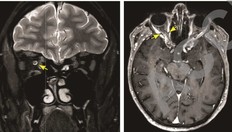Cranial nerve disorders associated...
Immune checkpoint inhibitors (ICIs) are novel drugs that have revolutionized oncological practice by increasing survival in patients with advanced tumors, including melanoma, non-small cell lung cancer (NSCLC), and kidney cancer. ICIs are able to potentiate T-cell activation and, consequently, lead to an immune attack against cancer cells. Given their mechanism of action, ICIs may unleash a number of immune-related toxicities. Neurological disorders triggered by ICIs are relatively rare, involving approximately 1-3% of the patients, yet are potentially disabling or even fatal.
lt features of ICI-induced central (i.e. limbic encephalitis, meningoencephalitis, and cerebellitis) and peripheral manifestations (peripheral neuropathy, myasthenia gravis, and myopathy) were recently described in relatively large series and it appears that these phenotypes might differ from their classical neurological counterparts. Conversely, only a few case reports and small case series have reported cranial nerve disorders following ICIs (Cn-ICI) as possible complications, and therefore, information on the spectrum, treatment and outcome of Cn-ICI is limited.
In the present study we describe the clinical characteristics, treatment, and outcome of Cn-ICI diagnosed at the French Reference Center for Paraneoplastic Neurological Syndromes and Autoimmune Encephalitis (Lyon, France). We also analyze previously reported cases of Cn-ICI obtained from a systematic review of the literature.




